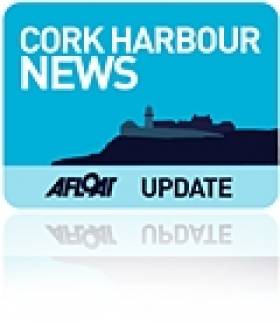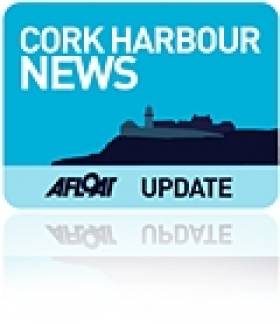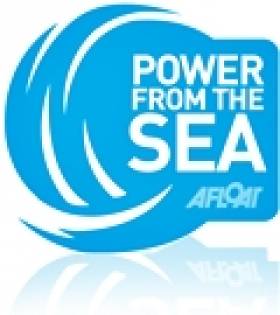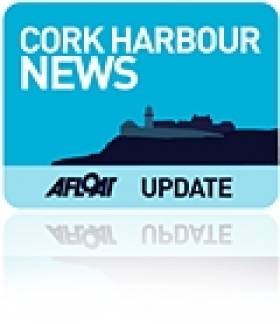Displaying items by tag: Haulbowline Island
#CorkHarbour - Marine Minister Simon Coveney has announced details of the timetable for a two-and-a-half-year programme of core remediation works at Haulbowline Island, which will see the remediation of the island completed by mid 2018.
This follows a Government decision to provide a total of €61 million to remediate the location on a “whole of Island basis”, incorporating both the East and South tips and including a ground level remediation of the former ISPAT/Irish Steel factory site.
At a meeting of the Haulbowline Remediation Project Stakeholders group today (8 January), the minister outlined the elements involved in the remediation timetable.
“These works, which are part of the Government’s wider commitment to Cork Harbour will, when completed, lead to the permanent transformation of the Island and provide significant potential for development in the coming years," he said.
"The remediation project will see the former waste site at the East Tip become a large public amenity park and a ground level remediation of the former factory site, opening up significant development possibilities for this key strategic location, already the permanent location of the Irish Naval Service."
He added: "These complex remediation works which have been devised by Cork County Council who are acting as agents of my own Department in this project, will provide significant employment [for the duration of the works] and eventually ensure that the historic island of Haulbowline will have a very bright future at the centre of Ireland’s existing dedicated maritime cluster in Cork Harbour.”
Minister Coveney also outlined that he is actively considering the repair of three large cut stone buildings adjacent to the former ISPAT/Irish Steel factory.
“These three landmark buildings which were part of the old Naval base and were also office accommodation for the steelworks have fallen into disrepair over the years," he said.
"To prevent further deterioration of these impressive historic buildings, I have asked my officials to bring forward immediate proposals for consideration by the Government on how to weatherproof the structures and undertake necessary measures to safeguard these heritage assets for future generations.”
#CorkHarbour - Marine Minister Simon Coveney yesterday (12 May) attended the contract signing for the remediation of bridge access Haulbowline Island, a €1.85 million deal that was awarded by Cork County Council to L&M Keating Ltd.
Commenting at the signing, the minister said the "major contract" is "a key infrastructural element of the remediation project" for the toxic waste dump at the former Irish Steel/Ispat site on the Cork Harbour island.
The work, which will extensively upgrade the current bridge infrastructure, will address significant access demands involved in carrying out the remediation of Haulbowline, with a view to the future development of the island and surrounding areas in the longer term.
Minister Coveney said he welcomed the decision by An Bord Pleanála to grant planning permission for the remediation of the East Tip and awaits a decision from the Environmental Protection Agency (EPA) on the application for a waste licence.
"The project is now entering an exciting phase where the hard work that has been going on behind the scenes will now lead to construction activity on the island.”
Decision Due Next Month On Future Of Cork Harbour Toxic Dump
#CorkHarbour - 24 April is the date set for a decision on the clean-up of the toxic waste site on Haulbowline Island in Cork Harbour, as RTÉ News reports.
The news comes at the conclusion of the oral hearing into proposals for the former Irish Steel/Ispat plant, for which the only submission received was from the applicant Cork City Council.
The hearing was told by risk consultants representing the council that the site in its present state no immediate or long-term risk to the community at large.
However, Dr Cecilia MacLeod of consultants WYG echoed the concerns of local councillors last month over breaches in the embankments around the toxic dump, which contains some half a million tonnes of waste, when she said the site remains a health risk to the locality.
Plans for the site currently involve landscaping the area, with a perimeter wall to prevent leaching of potentially hazardous or carcinogenic matter.
RTÉ News has more on the story HERE.
New Marine Energy Lab for Cork Harbour
#POWER FROM THE SEA - A new marine research lab in Cork Harbour could help Ireland to be a global leader in renewable energy, the Irish Examiner reports.
The Beaufort Laboratory, being built on a three-acre site next to the National Maritime College of Ireland on Haulbowline Island, is set to be completed by 2016.
And scientists at the €14 million lab have told Minister for Energy Pat Rabbitte that it will be the largest marine renewable energy research facility in the world.
Expected to be a base for 135 researchers from University College Cork (UCC), the lab also hopes to attract the world's top researchers in marine energy to the area, with an aim to exploiting the potential for jobs in the fast-growing ocean energy sector.
The new lab forms part of the Irish Maritime and Energy Resource Cluster (IMERC) established to promote the country as a world-renowned research and development location, as previously reported on Afloat.ie.
The Irish Examiner has more on the story HERE.
Haulbowline Toxic Waste Site Will Be Cleaned Up by 2014 Says Govt
#CORK HARBOUR - The Government has finally set a deadline for the clean-up of the toxic waste site on Haulbowline Island in Cork Harbour, under threat of massive fines from the European Commission.
RTÉ News reports that a two-and-a-half year deadline has been set to complete the sanitation of the illegal dump on the island at the site of the former Irish Steel/Ispat plant.
Some 500,000 tonnes of waste, including toxic heavy metals and cancer-causing materials, have been blamed for the area's notoriety in having one of the highest cancer rates in Ireland.
As previously reported on Afloat.ie, in October last the Government signed off on a €40m package to begin clean-up of the toxic waste site on the island.
In an editorial yesterday, the Irish Examiner welcomed the Government's decision, but emphasised it was long overdue.
"[It] cannot dispel the great frustration that it has taken so very long to do what should have been done years ago," the paper said.
"To this day nobody has explained how an illegal dump of this scale was allowed to develop on a site that is not exactly secluded, remote or out of the public eye - it is, after all, just next door to the country’s main naval base."
The Irish Examiner also reports on worries that the toxic waste may never be fully removed from the island, but rather sealed off and made impermeable.
Minister for the Marine Simon Coveney was quoted as saying: "This whole clean-up plan will be peer reviewed so it’s best practice but it could be better to contain the material onsite rather than remove it.
"We will be doing all that is reasonable to ensure the site is safe."

































































